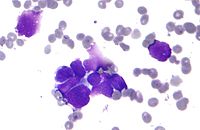
Photo from wikipedia
Atkins and colleagues [1] recently tested the combination of axitinib plus pembrolizumab in previously untreated patients with metastatic clear-cell renal cell carcinoma (RCC). The encouraging results from this phase 1b… Click to show full abstract
Atkins and colleagues [1] recently tested the combination of axitinib plus pembrolizumab in previously untreated patients with metastatic clear-cell renal cell carcinoma (RCC). The encouraging results from this phase 1b trial demonstrated that this treatment combination had a tolerable safety profile and promising antitumour activity. Of note, 46% of the participants enrolled had a favourable risk score according to International Metastatic Renal Cell Carcinoma Database criteria and only a few of these (14%) had liver metastases, which are associated with poor prognosis. Although enrolment of patients with favourable prognostic variables could have partly influenced the positive results achieved, the data are even more interesting if we consider the recent findings of Checkmate 214 [2]. The phase 3 Checkmate 214 trial demonstrated a clear clinical benefit for patients with intermediate-/poor-risk features receiving the combination of mivolumab and ipilimumab over sunitinib, but this benefit was not confirmed in patients with favourable risk on exploratory analyses. If the positive results for the combination of pembrolizumab and axitinib are confirmed in further larger trials, it will be interesting to explore if this benefit will also apply to patients with favourable risk. Of note, the clinical activity of this combination seemed to show a significant benefit in patients who did not express the PD-L1 ligand. A complete response and partial response were observed in four patients (12%) and 20 patients (59%), respectively, of the 34 patients with no PD-L1 expression. Of course, this small number does not allow clear conclusions, but if we also consider previous evidence emerging from larger trials exploring immunotherapy in metastatic RCC, PD-L1 expression does not seems a reliable predictive marker of tumor response. In this line, subgroup analysis of Checkmate 025 and the results of Checkmate 214 seem to indicate a better clinical outcome for immune therapy in
Journal Title: European urology
Year Published: 2018
Link to full text (if available)
Share on Social Media: Sign Up to like & get
recommendations!